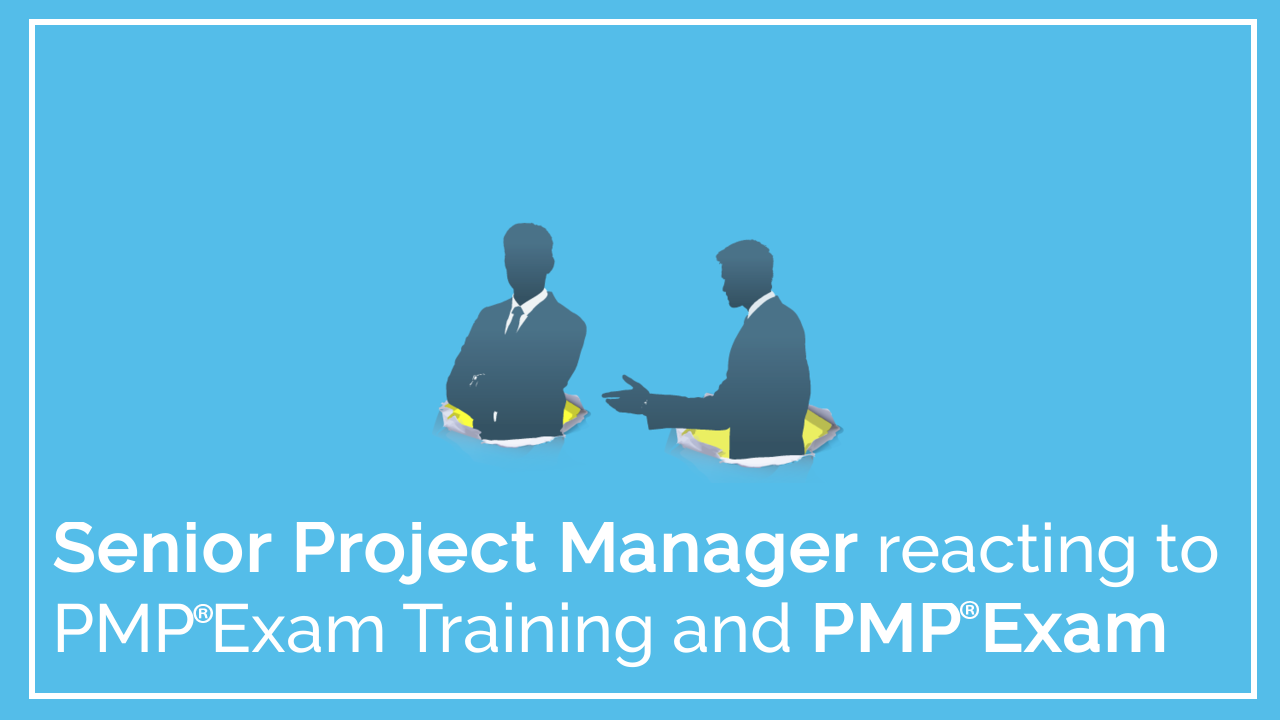
The experienced PM meets the PMP®
Jun 09, 2017In the years that I have been helping people pass the PMP® exam, I have come across a small number of seasoned Project Managers that were unable to pass the exam. More often than not, these people were either referred to me or reached out to me because they had recently failed the PMP® exam and didn’t know where they had gone wrong. The typical profile of this person was someone who was a savvy PM, who had maybe between 10 and 20 years’ experience running projects. For many of these folks it seemed completely meaningless that they should have to, at this point in their career, have this career-blocking exam placed in front them. They’d been successfully running projects for decades, and couldn’t understand why they needed the exam, or why it was proving so difficult to pass.
The truth is, the PMP® exam has become a de facto standard — globally — for Project Managers, and in most industries it’s accepted as a standard bearer for the things a PM should know when running a project. Many young professionals graduate from college, work a few years, pass the PMP exam and then go on to compete with veterans in the industry who have decades’ more experience, but not the PMP credential, and this will put those veteran Project Managers at a real disadvantage. I’ve seen too many experienced Project Managers forget the skills they use in their jobs and go on to mismanage the “project” of getting their PMPs. They take a long and winding road that often includes the following wrong turns:
1. They feel they must prove they know more than the PMI®.
Experienced Project Managers sometimes spend too much time protesting how much the Project Management Body of Knowledge (PMBOK® Guide) does not reflect the real world.
While that complaint may have its points, we all learned in school how much different a textbook can seem from real life. However, when your social studies teacher gave you a test, you had to know the facts from the textbook, right? The truth is that there are principles, tools and techniques laid out in textbooks that give us nuggets of help to draw on in our career. This is where you’ll need to learn to think in PMI® terms. If PMI® says the sky is green and you look up and see it’s blue, well, guess what? If you want to pass the PMP® exam — it’s green.
2. They won’t follow the study plan.
Here’s something that can happen with any adult student learner: they don’t believe me when I say they must study the material in the methodical way I suggest they do. I get it, I do. We all have busy lives that include jobs, and housework, and maybe children, and it can be difficult enough to find the time to study at all, let alone follow a step-by-step process for doing so. However, I have a proven method of walking students through the material they’ll need to know for the exam — knowledge area by knowledge area — over a 10-week period.
There’s a helpful saying that communicates something along the lines of “The wisest people know how much they don’t know.” People who are studying for the PMP® exam often think they know what they don’t know, but they usually don’t. Those who follow the checklist I provide always end up saying how helpful it was, and many students of mine who have ended up passing the PMP® exam have commented over the years about how the checklist was an unexpected but key component to their success.
3. They are afraid to do practice exams – and resist completing them in a timely fashion.
Since they are afraid of the exam — or failed it already – students don’t want to sit down and complete 200 question practice exams. It’s too intimidating, and fear of failing can actually prevent them from even starting. Part of my coaching encourages them to start with a 50-question exam, and as their confidence grows, so does their independence. After a few 50-question assessments and some good scores, they start doing larger exams successfully.
It is particularly rewarding to help people who go through this pass the PMP® exam because it’s actually pretty cool to school a seasoned professional and have them learn something amazing they couldn’t master before.
Yeah, I know for some people the PMP® can seem like an unfair assessment or an arbitrary milestone, and that an experienced PM should not be forced to go through the process of earning the credential. Experience should speak for itself right? Well, what I’ll say is that throughout life, we’re forced to overcome barriers to entry like the PMP® exam, and we have one of two ways to approach it: we can cross our arms, call foul and say that we shouldn’t have to comply, or we can realize that there are times in life, that, despite our individual skills or creativity, we are simply going to be judged by when we click submit on a button in a testing center.
Whether you’re a seasoned veteran Project Manager or a Project Manager with just a few years’ experience and you find the process of getting your PMP® intimidating or overwhelming, just ask yourself: Is not having the PMP® constraining my career growth? Do I want to have those three letters at the end of my name? I know you’ll find out that the work it takes to earn those three letters will be worth it when you see how your opportunities multiply once you’ve passed the exam.
Written by The PM Tutor Dan Ryan, MBA, PMP www.pmexamcoach.com
Get Help From Coach Dan Now! Fill Out a Quick Form and Jump Onto Zoom With Dan!

